INTERNACIONAL
Soros v Trump: Socialists targets conservatives in upcoming European nation’s election

A former Albanian ambassador to the U.S. says the country’s upcoming election will be more like a runoff between the policies of President Trump and George and Alex Soros as opposition parties call foul over corruption by the ruling socialists.
«Albania is now effectively a one-party system pretending to hold elections,» Agim Nesho, former Albanian ambassador to the United States and the United Nations, told Fox News Digital. Nesho said May’s election «is a clash between ‘Trump-ists’ and ‘Soros-ists,’ with the latter fighting to keep their grip on corruption and the state in Albania.»
Amid accusations of corruption and the recent arrests of major Albanian political candidates, some critics are voicing concern over the integrity of upcoming elections for the country’s 140-member Parliament, now scheduled for May 11.
Nesho claimed the country’s ruling socialists «led by Prime Minister Edi Rama, is undemocratic and deeply rooted… for over 12 years, it has been supported by rich left-wing donors like Alex Soros, Rama’s close friend, and by projects like the USAID and Open Society [Foundations] judicial reform, which Rama co-opted and twisted to attack the center-right, conservative opposition.» He claimed the prime minister «also oversees a powerful narco-state that spreads fear and exerts controls over elections.»
ALBANIANS RALLY BY THE THOUSANDS AGAINST RULING SOCIALIST GOVERNMENT
Albanian opposition supporters hold a placard showing President Donald Trump and Albanian opposition leader Sali Berisha during an anti-government protest in in Tirana on Feb. 8, 2025. (Adnan Beci/AFP via Getty Images)
President Trump’s former campaign manager, Chris LaCivita, joined the campaign of Sali Berisha, the leader of Albania’s right-wing Democratic Party in February, according to Politico. LaCivita told the publication that Berisha would be «a true friend of the United States and… will successfully work with President Trump and the United States.» He called Rama a «puppet of George Soros.»
Berisha, formerly president and prime minister of Albania, told Fox News Digital that Rama’s government «banned my name and the name of the party in the voting list» during May 2023 elections. «When they failed with these measures,» he said they went further.
Parliament stripped Berisha’s legal immunity in December 2023 and placed him on house arrest under the accusation that he had used his position to help his son-in-law acquire private land. Berisha says that «official documents proved» the land belonged to his son-in-law’s grandfather, and had been confiscated by the former Communist regime.
Last November Berisha was released from house arrest. He was formally charged with corruption in September, the Associated Press reported.
Berisha’s spokesperson, Alfred Lela, told Fox News Digital that Berisha is now awaiting trial.
In addition to Berisha, Centrist Freedom Party leader and former Albanian President Ilir Meta was arrested on corruption charges in October 2024 in what one source told Fox News Digital was a «weaponization of the judiciary and law enforcement agencies.» Once an ally of Rama, Meta has frequently noted the increasing corruption and authoritarianism of the Rama government.
6 POPULIST LEADERS FACING LAWFARE AROUND WORLD
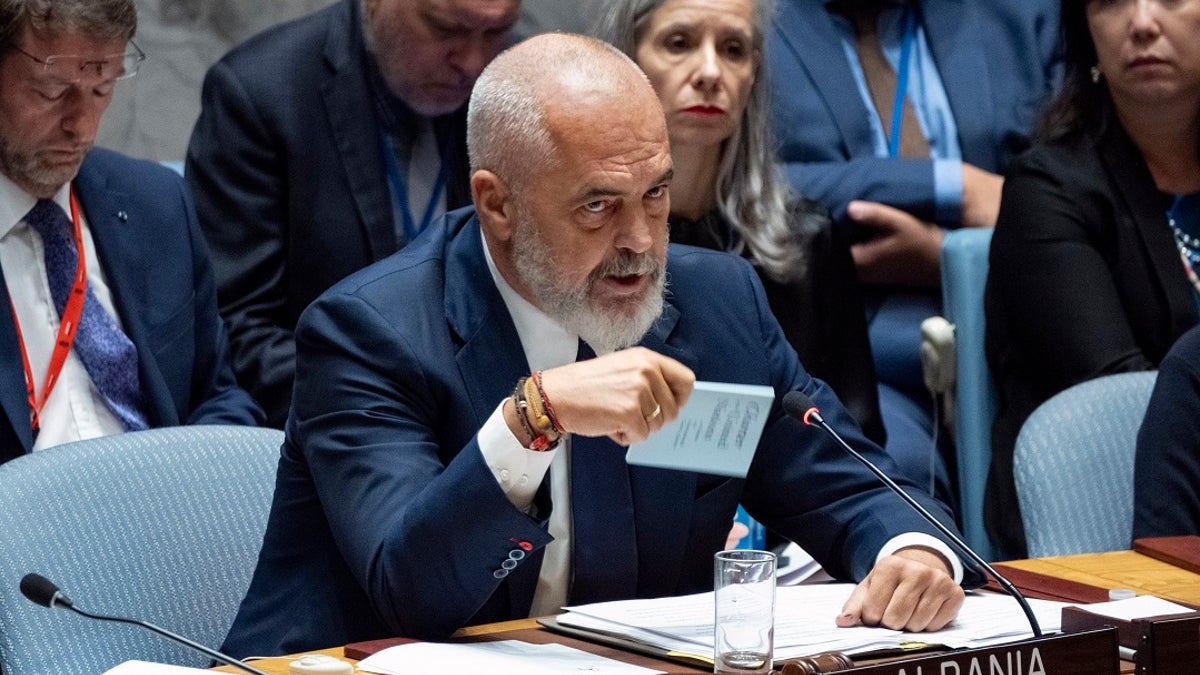
Prime Minister of Albania Edi Rama speaks during a Security Council meeting on Ukraine, Sept. 20, 2023, at United Nations headquarters. (AP Photo/Craig Ruttle)
George Soros’ Open Society Foundations (OSF) has invested more than $131 million in Albania between 1992 and 2020, effectively «supporting Mr. Rama’s rise to power,» the European Center for Law & Justice reported in 2023. The center alleges that OSF helped to allocate some of the $60 million that USAID spent on judicial reform in Albania between 2000 and 2015, explaining that Rama’s opposition has «denounced this reform as aimed at enabling the government to take control of the judiciary.»
OSF offices in Albania and the U.S. did not respond to numerous inquiries from Fox News Digital about allegations placed by its opponents against it.
According to an OSF website, the group has «earmarked $600,000 to support the process to overhaul Albania’s judicial system» in 2015 as part of Albania’s preparations to join the European Union. OSF claims «the money was used to fund a 20-strong expert panel, conduct public outreach and opinion surveys, establish a dedicated website, and organize conferences.»
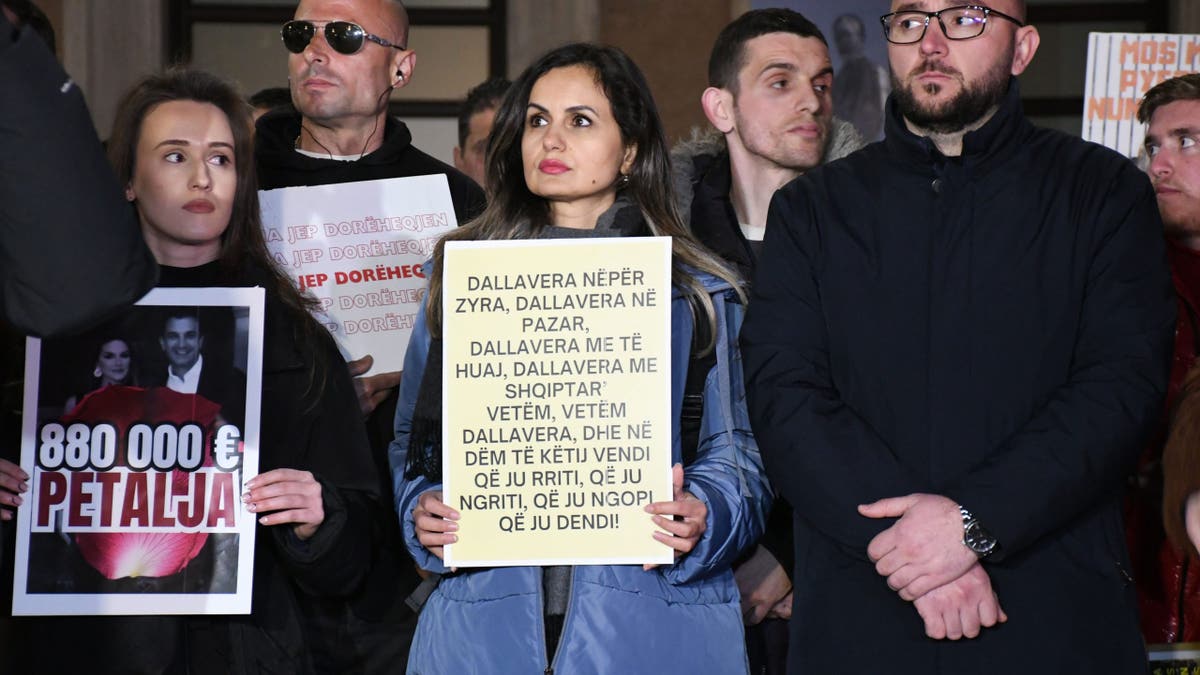
Protesters gather in front of Prime Minister Edi Rama’s office in Tirana, Albania, demanding his resignation on Feb. 11, 2025. (Olsi Shehu/Anadolu via Getty Images)
NewsNation reported that Alex Soros often travels to Tirana, and calls it his «second home.» In July 2021, Soros posted a selfie with Rama on Instagram, identifying the prime minister as his «good friend.»
Berisha says he asked eight years ago for the U.S. Congress and European Parliament «to ban [George] Soros’ political activity in Europe because he is an enemy of democracy.»
In a December speech, Berisha said he would ban the OSF from Albania, calling the group a «real national threat,» according to Euronews Albania. Berisha said the Rama government’s mismanagement of resources and failure to mitigate poverty had forced the emigration of 45% of Albanians.
FORMER ALBANIAN PRESIDENT ARRESTED ON CORRUPTION CHARGES, OPPOSITION CLAIMS CHARGES ARE POLITICALLY MOTIVATED
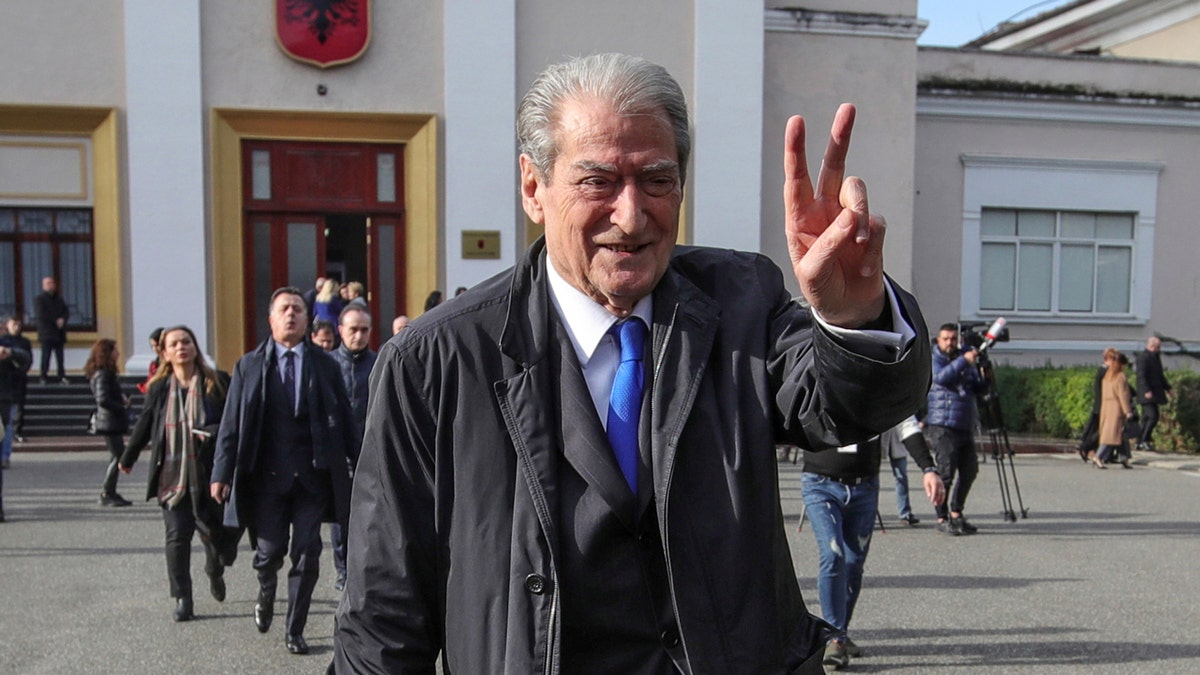
Opposition leader Sali Berisha leaves the Parliament in Tirana, Albania, Dec. 21, 2023. (AP Photo/Armando Babani)
Another impediment to Berisha’s run is the sanctions that former Secretary of State Antony Blinken announced against Berisha, his wife, and his children in May 2021. Blinken said Berisha had been «involved in corrupt acts, such as misappropriation of public funds and interfering with public processes, including using his power for his own benefit and to enrich his political allies and his family members at the expense of the Albanian public’s confidence in their government institutions and public officials.»
Berisha claimed that the sanctions against him were «entirely based on corrupted lobbying» by George Soros and Rama. He also said members of the Biden administration «turned [the] U.S. Embassy in Tirana into a huge prosecutorial office,» urging supporters, journalists and business people to stop supporting Berisha and his party, and that the State Department «asked other countries to sanction and to isolate me.»
Berisha said sanctions have hindered his campaign. «Of course it hurts me, because I’m not able to meet with Albanian Americans, which are so numerous, and in this election, for the first time, they have the right to vote for the party and candidate they prefer in their country of origin.»
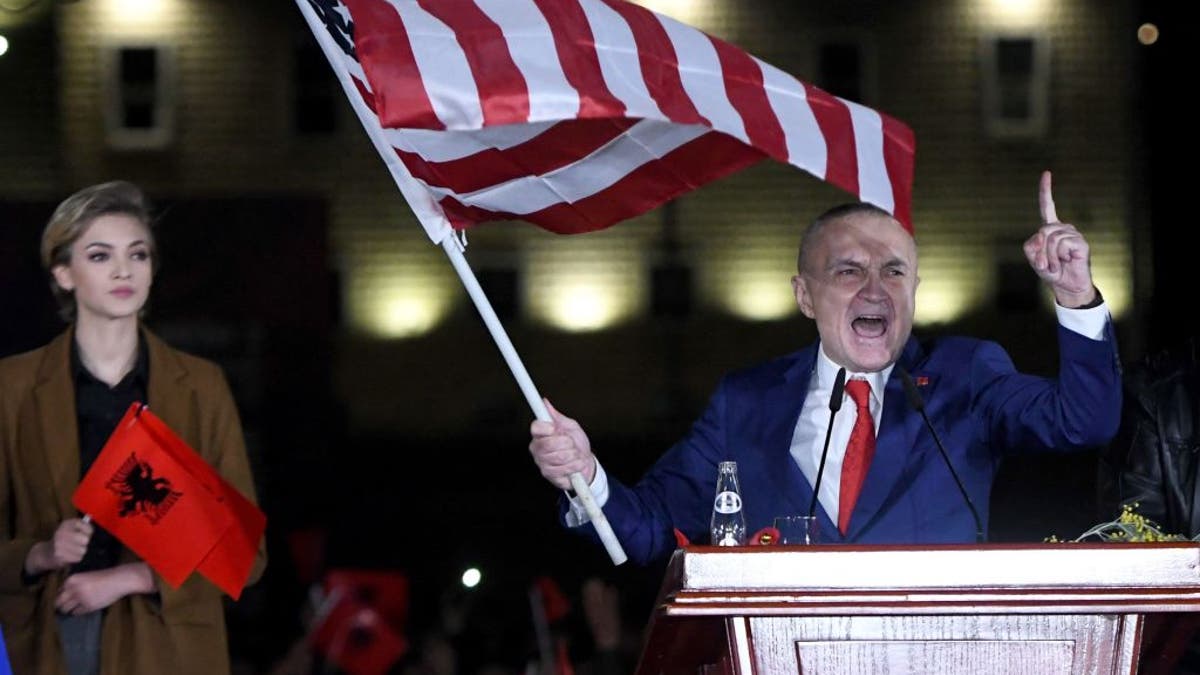
Then-Albanian President Ilir Meta holds an American flag as he delivers a speech during a rally in Tirana, on March 2, 2020. (Gent Shkullaku/AFP via Getty Images)
A State Department spokesperson said they had no comment about Berisha’s claims that U.S. entities turned supporters against him. The State Department did not respond to questions from Fox News Digital about whether sanctions against Berisha should be upheld, or if they impede free and fair elections in Albania.
A spokesperson for former President Joe Biden did not respond to questions on whether his administration had a role in turning supporters against Berisha.
Nesho noted that sanctions «lack… evidence and had been rejected by Albanian public opinion. It looks like a political move, driven by Rama’s big money allies such as Alex Soros, who benefit both commercially and in influence from keeping Rama in power.» Nesho called on the Trump administration to «lift this ban immediately. It’s stirring anti-American feelings and clashes with the values of democracy and fairness,» he added.
CLICK HERE TO GET THE FOX NEWS APP
Nesho claimed that «the last three elections were unfair, full of intimidation and theft. The upcoming May 11, 2025, election shouldn’t just be a fake show – it needs to be truly free and fair. The U.S. and EU must push for this or ask that the vote is delayed until it can meet proper standards.»
Fox News Digital also reached out multiple times to Albanian Prime Minister Rama, the OSF, a member of the Albanian Foreign Ministry, and the Albanian Embassy in Washington, D.C., for comment about accusations of corruption and OSF election interference but received no response.
INTERNACIONAL
Democrats silent on illegal alien registered to vote in blue state

NEWYou can now listen to Fox News articles!
Maryland Democratic Gov. Wes Moore and other Democratic leaders have fallen silent after it was discovered that illegal alien Ian Andre Roberts, who was recently arrested by ICE, is registered as an active Democratic voter in the state.
Fox News Digital reached out to Moore’s office and the offices of Maryland’s two Democratic senators, Sen. Chris Van Hollen and Angela Alsobrooks, and Rep. Glenn Ivey, D-Md., asking for their response to an illegal alien being a registered Democratic voter in their state, but did not receive a response by the time of publication.
This week, the Maryland Freedom Caucus blew the whistle on Roberts being listed as an active Democratic voter on the state’s official elections board website despite not being a U.S. citizen and not having lived in Maryland for years.
IOWA SCHOOL SUPERINTENDENT ARRESTED BY ICE, FACING PRIOR WEAPONS CHARGES, ALLEGEDLY FOUND WITH LOADED HANDGUN
Republicans say that illegal alien Ian Andre Roberts being registered to vote in Maryland raises serious concerns about the state’s voting processes. (Keith Srakocic/AP Photo and ICE)
On Tuesday, SBE sent a statement to Fox News Digital that a review of public information available through Maryland’s Public Information Act «did not show any voting history for any individual with the name Ian Andre Roberts in Maryland.»
The statement further said that due to Maryland law protecting personal identifying information from disclosure, SBE «cannot and will not publicly announce whether media reports about the individual in question is or is not or was or was not a registered voter in Maryland.»
Finally, SBE noted that according to Maryland law, it is not a crime to unintentionally register to vote despite not being eligible. The office added that «the right to vote is a sacred right that has been expanded through sacrifices of many before us» and «this office will not disenfranchise a voter based upon partial or unsubstantiated evidence.»
EX MICHELLE OBAMA AIDE LEADS DES MOINES SCHOOL BOARD’S DEFENSE OF SUPERINTENDENT ARRESTED BY ICE
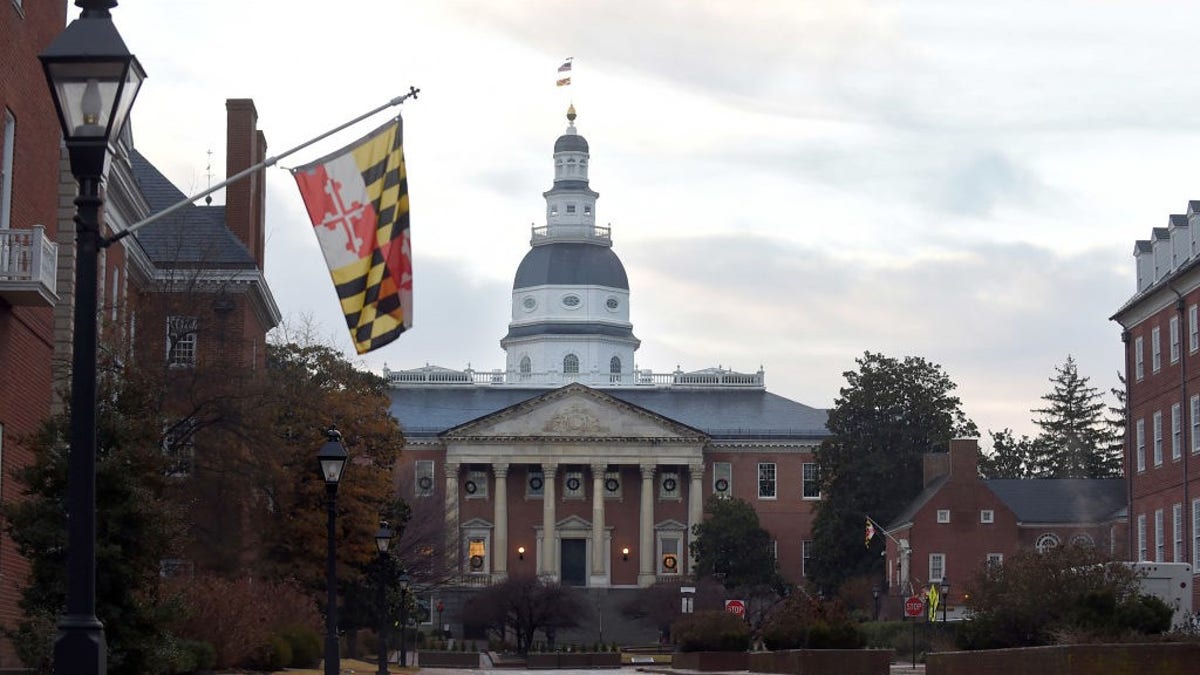
The Maryland State Capitol in Annapolis. (Getty)
In response, Republican state Delegate Matt Morgan, who is chair of the Maryland Freedom Caucus, told Fox News Digital that SBE’s statement only leads to more questions. The Maryland Freedom Caucus sent a letter to SBE on Monday demanding answers about «gaping holes» in the state’s election integrity systems.
«Basically, the board of elections has the excuse that Mr. Roberts was registered accidentally, and therefore he didn’t break a law. This leads me to ask how many other people are accidentally automatically registered? Why was he automatically registered as a Democrat?» said Morgan.
«The Maryland Freedom Caucus looks forward to receiving answers from the state [Board of Elections] on these questions soon,» he added.
SOCIAL MEDIA ERUPTS AFTER ICE ARREST OF SUPERINTENDENT IN IOWA: ‘CRAZY STORY’
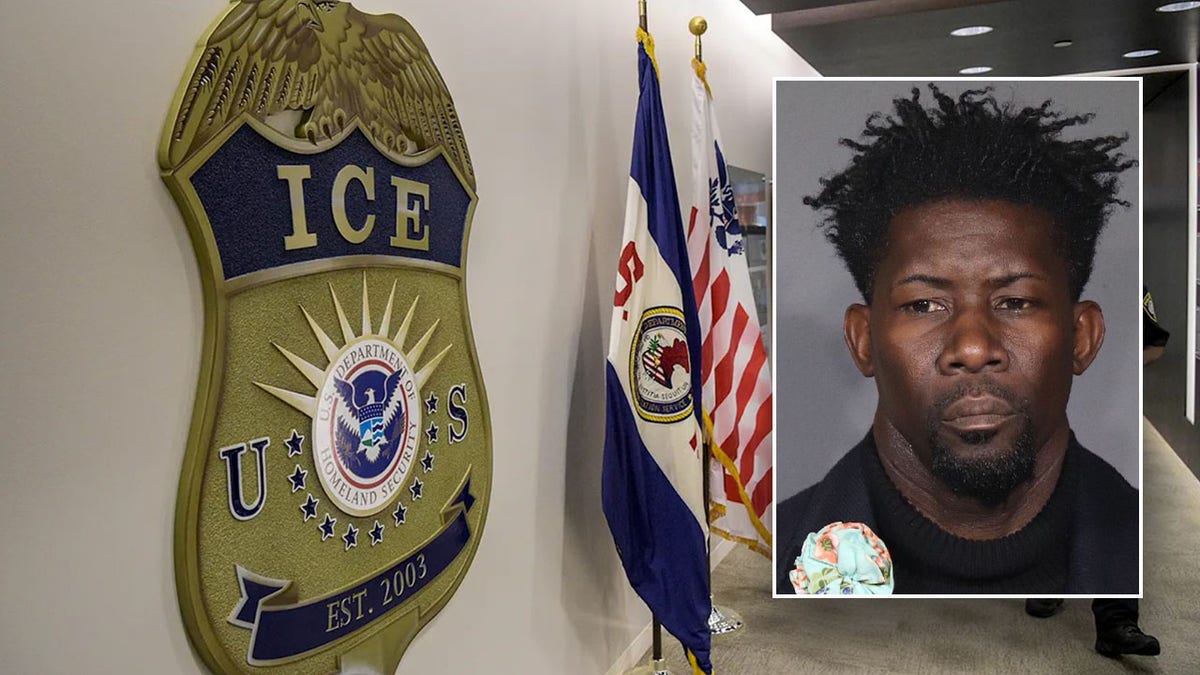
Ian Roberts, formerly the head of Des Moines Public Schools, was arrested by immigration authorities last week. (Getty Images; ICE)
According to Morgan, Roberts’ registration means that he is eligible to vote in all federal, state and local elections despite not being a U.S. citizen, and also despite likely not having lived in Maryland for the past decade.
Morgan pointed to a letter the elections board sent to the Justice Department in August in which State Administrator of Elections Jared DeMarinis expressed concern that if the board gave over voter information to the federal government, that data would be «used for enforcement of immigration laws against Maryland residents.»
Roberts was working as the superintendent of public schools in Des Moines, Iowa, until he was arrested by ICE last week. According to officials, he attempted to flee ICE agents and was taken into custody on a fugitive warrant. He was found with $3,000 in cash, a fixed-blade hunting knife and a loaded Glock 19 firearm, according to ICE.
MARYLAND SENATOR SAYS ICE FACILITY HIDES ‘EVIL PERSISTING IN DARKNESS’ AFTER DENIED ACCESS
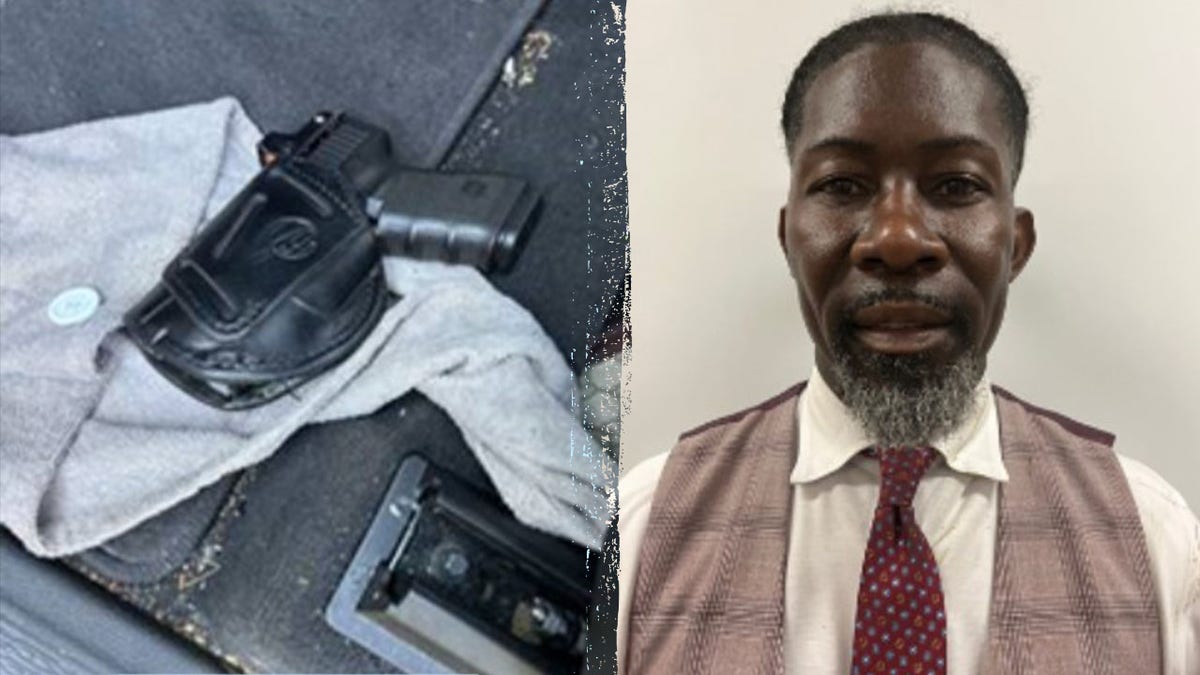
Authorities said a handgun was found in a vehicle used by Ian Roberts to flee from pursuing ICE agents. (ICE)
He came to the U.S. in 1999 from Guyana on a student visa and was arrested by ICE last week after having a final order of removal issued against him in 2024. He was hired as head of the Des Moines public schools in 2023 despite having illegal weapons possession charges against him from 2020.
CLICK HERE TO GET THE FOX NEWS APP
This comes after several Maryland Democrats, including Van Hollen and Ivey, have been outspoken in their support for the rights of illegal immigrants, even flying to El Salvador earlier this year to visit a suspected MS-13 gang member named Kilmar Abrego Garcia, who at the time was imprisoned after being deported by the Trump administration.
illegal immigrants,immigration,migrant crime,democratic party,maryland
INTERNACIONAL
Sigue la tensión en Madagascar: la destitución del gobierno no logró frenar las protestas

Miles de manifestantes marcharon en nuevas manifestaciones callejeras en Madagascar el martes, donde la policía disparó gases lacrimógenos y balas de goma, según pudieron comprobar periodistas de AFP, a pesar de que el presidente Andry Rajoelina destituyó a su gobierno en un intento por frenar días de disturbios mortales.
Inspirado por las protestas de la “Generación Z” en Indonesia y Nepal, el movimiento juvenil ha denunciado la persistente mala gobernanza, indignado por los repetidos cortes de agua y electricidad en la empobrecida nación del Océano Índico.
Miles de personas se congregaron en la capital, Antananarivo, tras las convocatorias en redes sociales, y se congregaron en el céntrico barrio de Ambohijatovo, donde se pidió a los diversos grupos de manifestantes que se reunieran.
Grandes multitudes marcharon, coreando consignas pidiendo la dimisión de Rajoelina y ondeando banderas con una calavera pirata del anime japonés “One Piece”, que se ha convertido en el símbolo de las manifestaciones juveniles.
Se oyeron explosiones y gritos mientras grandes contingentes policiales, respaldados por un vehículo blindado, dispersaban a la multitud con gases lacrimógenos y balas de goma, mientras se elevaba humo de las hogueras encendidas en las calles.
Las protestas comenzaron en Antananarivo el jueves y se extendieron a otras ciudades del país, con casi 32 millones de habitantes.
Tras las protestas de la semana pasada en la capital, se produjeron saqueos nocturnos generalizados, lo que llevó a las autoridades a declarar un toque de queda desde el anochecer hasta el amanecer.
El lunes, Rajoelina destituyó a todo su gobierno, se disculpó por la inacción de sus ministros y prometió encontrar una solución a los problemas del país; sin embargo, esto no fue suficiente para poner fin a las protestas.
La destitución del gobierno “fue una pequeña victoria”, declaró Masova, activista de 30 años, bajo seudónimo por temor a represalias.
“Realmente queremos un cambio, el Estado de derecho, justicia para todos. Por eso ya no es solo un movimiento de la Generación Z”, declaró a la AFP.
“La lucha no se detendrá hasta alcanzar la meta”, publicó el movimiento de la Generación Z en redes sociales el martes por la noche, llamando al pueblo malgache a “despertar”.
El principal sindicato que representa a la empresa nacional de distribución de agua y electricidad anunció el martes una huelga general.
Los manifestantes exigen la dimisión de Rajoelina, de 51 años, quien llegó al poder en 2009 tras un golpe de Estado provocado por un levantamiento que derrocó al ex presidente Marc Ravalomanana.
“Señor Andry Rajoelina, cuando lideraba las protestas, se le permitía hacerlo, estaba bien. Pero cuando los jóvenes nos alzamos para luchar por nuestro país, intenta silenciarnos”, declaró el lunes un estudiante manifestante vestido de negro, en consonancia con un llamamiento en redes sociales a lamentar a los fallecidos.
Manifestaciones anteriores se han enfrentado a una fuerte respuesta policial, con al menos 22 muertos y más de 100 heridos, según la ONU.
Algunas de las víctimas eran manifestantes o transeúntes asesinados por la policía o las fuerzas de seguridad, según la oficina del alto comisionado para los derechos humanos de la ONU, quien condenó el uso de munición real.
El gobierno ha rechazado el recuento, calificándolo de no verificado y “basado en rumores o desinformación”.
Tras no presentarse a las elecciones de 2013 debido a la presión internacional, Rajoelina fue reelegido en 2018 y reelegido en 2023 en unas elecciones disputadas y boicoteadas por la oposición.
El lunes, invitó a presentar candidaturas para un nuevo primer ministro durante los próximos tres días antes de que se forme un nuevo gobierno.
“El presidente forma parte de un sistema corrupto”, declaró un ingeniero agrónomo de 30 años, que habló bajo condición de anonimato. “Intenta hacernos creer que algo cambiará”. Mientras tanto, un llamamiento del presidente instando a los candidatos a puestos ministeriales a enviar su currículum vítae por correo postal o a través de LinkedIn fue ampliamente ridiculizado en redes sociales.
Los disturbios son los últimos de una serie de disturbios que han afectado a Madagascar desde su independencia de Francia en 1960.
Philibert Tsiranana, quien dirigió el país durante la era posterior a la independencia, se vio obligado a ceder el poder al ejército en 1972, tras la sangrienta represión de un levantamiento popular.
Madagascar se encuentra entre los países más pobres del mundo, pero es el principal productor de vainilla y posee recursos naturales en agricultura, silvicultura, pesca y minerales.
Casi el 75 % de la población vivía por debajo del umbral de la pobreza en 2022, según el Banco Mundial.
(Con información de AFP)
Civil Conflict,Demonstrations,Riots,Africa,Civil Unrest
INTERNACIONAL
Trump gives Hamas ‘three to four days’ to accept plan or meet a ‘a very sad end’
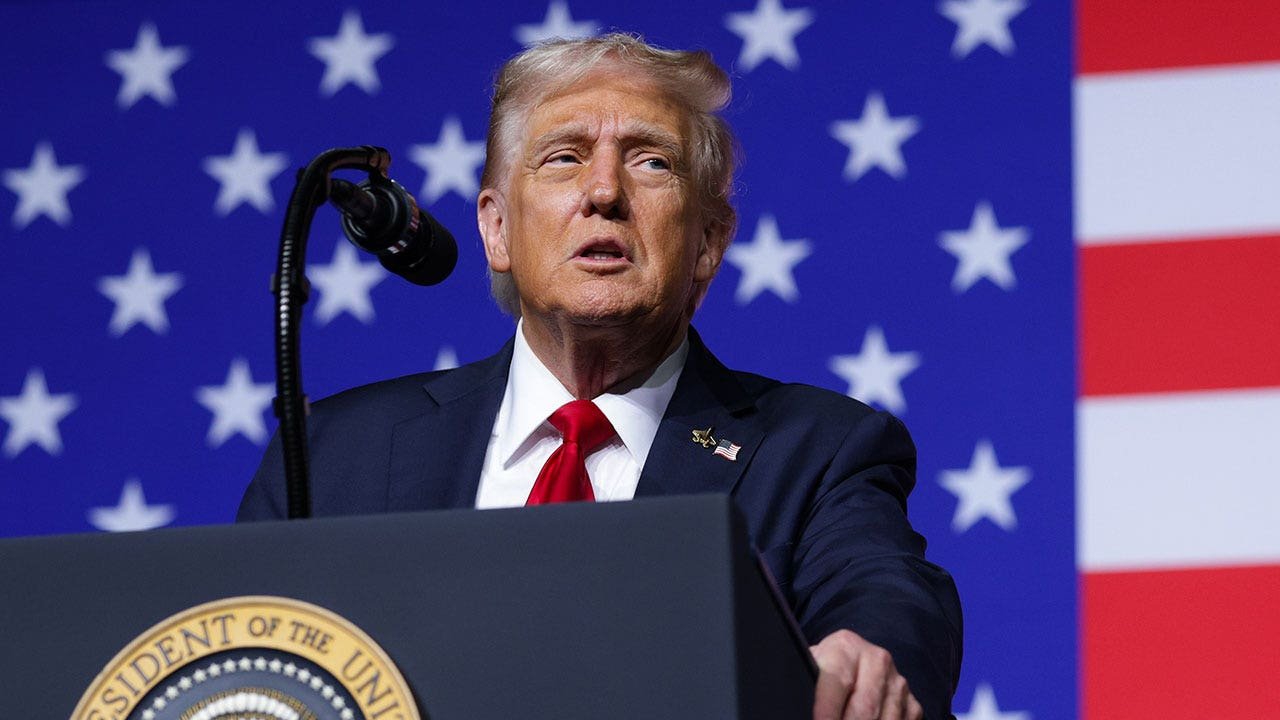
NEWYou can now listen to Fox News articles!
President Donald Trump on Tuesday said the Hamas terrorist network has up to four days to accept his 20-point peace plan to end the war in the Gaza Strip or face «a very sad end.»
«We’re going to do about 3 or 4 days. We’ll see how it is,» he told reporters. «Now, all of the Arab countries are signed up. The Muslim countries all signed up. Israel’s all signed up.
«And Hamas is either going to be doing it or not. And if it’s not, it’s going to be a very sad end,» he added.
TRUMP UNVEILS 20-POINT PLAN TO SECURE PEACE IN GAZA, INCLUDING GRANTING SOME HAMAS MEMBERS ‘AMNESTY’
Hamas fighters stand in formation as Palestinians gather to watch the handover of three Israeli hostages to a Red Cross team in Deir el-Balah, central Gaza, on Feb. 8, 2025. (Majdi Fathi/NurPhoto via Getty Images)
Israeli Prime Minister Benjamin Netanyahu on Monday accepted a plan that would ultimately end military operations in Gaza, disarm Hamas, secure the return of all 46 hostages and lay out a path to rebuild the war-ravaged Gaza Strip.
Fox News confirmed on Monday that top officials from Qatar and Egypt met with Hamas negotiators and shared the U.S.-backed plan.
The Hamas negotiators confirmed they would review it «in good faith and provide a response,» an official briefed on the talks said.
The plan has been widely championed by leaders across the Middle East, Europe and parts of Asia.
A joint statement issued by Saudi Arabia, Jordan, the United Arab Emirates, Indonesia, Pakistan, Turkey, Qatar and Egypt not only «welcomed» Trump’s proposal to end the war and rebuild Gaza, but also highlighted his commitment to addressing Israel’s security concerns, including barring the forced displacement of Palestinians and halting annexation of the West Bank.
NETANYAHU APOLOGIZED FOR AIRSTRIKES DURING ‘HEART-TO-HEART’ WITH QATARI LEADER, TRUMP SAYS
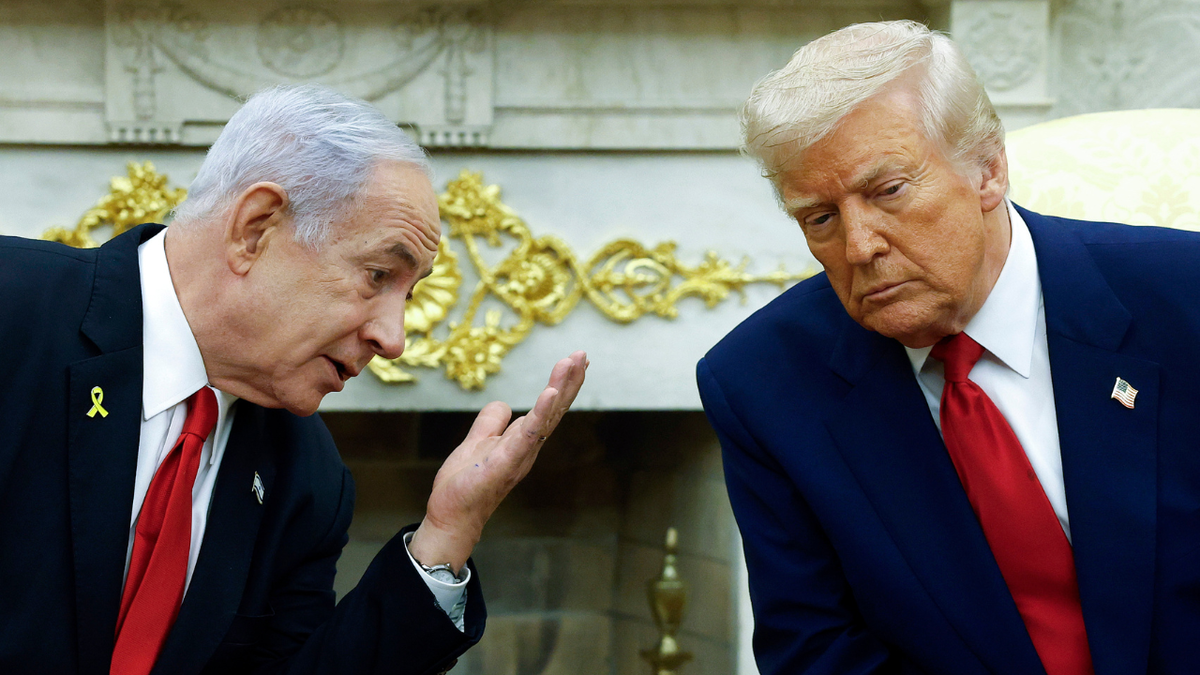
Israeli Prime Minister Benjamin talks to U.S. President Donald Trump during a meeting in the Oval Office of the White House on April 7, 2025, in Washington, D.C. (Kevin Dietsch/Getty Images)
«The ministers affirm their readiness to engage positively and constructively with the United States and the parties toward finalizing the agreement and ensuring its implementation, in a manner that ensures peace, security, and stability for the peoples of the region,» the joint statement said.
Similarly, British Prime Minister Keir Starmer and French President Emmanuel Macron — both of whom have said they now recognize the «State of Palestine» despite Washington’s opposition to the move — championed Trump’s peace plan in separate statements.
The 20-point proposal was met with mixed reviews in Israel, where hard-right officials within Netanyahu’s own coalition fiercely rejected the prime minister’s acceptance of the plan.
Netanyahu’s finance minister, Bezalel Smotrich, renewed questions over the fate of the prime minister’s coalition after he condemned the agreement on Tuesday as a «resounding diplomatic failure» and said it amounted to «a closing of eyes and turning our backs on all the lessons of Oct. 7.»
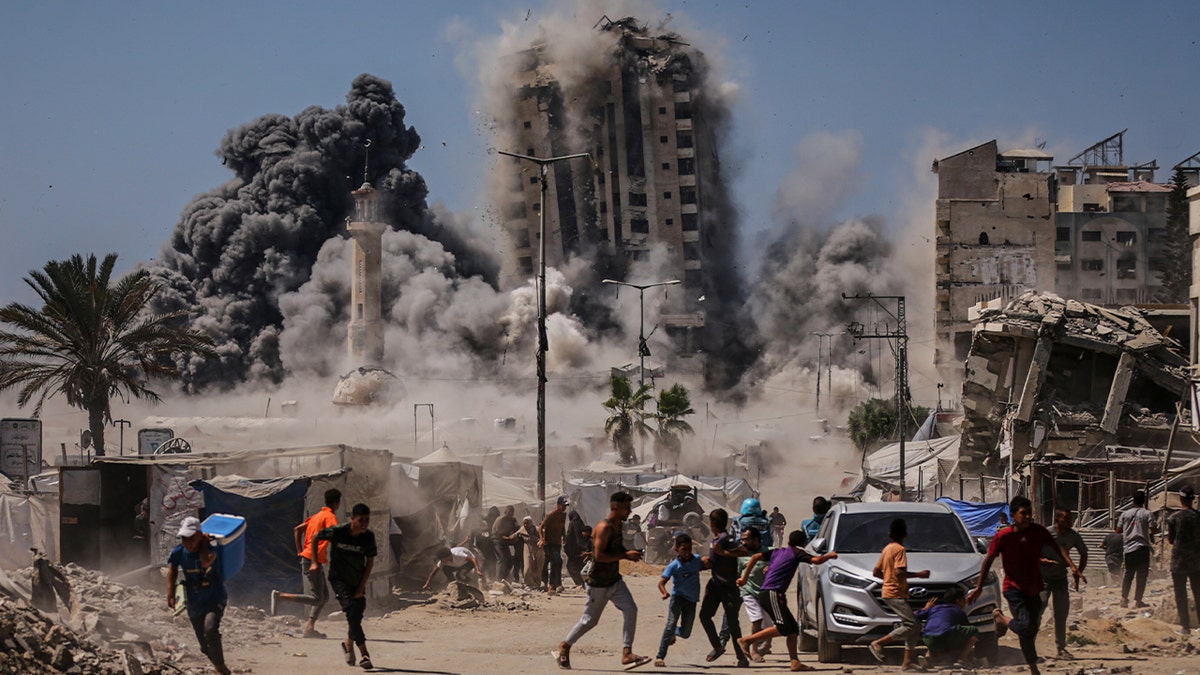
Palestinians run for cover during an Israeli airstrike on a high-rise building in Gaza City, Friday, Sept. 5, 2025, after the Israeli army issued a prior warning. (Yousef Al Zanoun/AP Photo)
CLICK HERE TO GET THE FOX NEWS APP
In contrast, fierce critics of Netanyahu, including Opposition leader Yair Lapid, said he is «convinced that amidst the tangle of interests and the pressing timeline dictated by the hostages’ situation, what President Trump presented yesterday is the only plan with feasibility.»
Blue and White Party leader, Benny Gantz, also confirmed that his party «would not allow petty politics to sabotage the plan.»
Fox News’ Trey Yingst contributed to this report.
donald trump,israel,middle east,benjamin netanyahu,world

 POLITICA2 días ago
POLITICA2 días agoEmilia Orozco: “Si vuelve el kirchnerismo, todo el esfuerzo que hicieron los argentinos se va a tirar a la basura”

 POLITICA3 días ago
POLITICA3 días agoCiudad vs. provincia. Los recelos y los negocios que reveló el triple crimen de Florencio Varela

 POLITICA1 día ago
POLITICA1 día agoKicillof habló del triple femicidio y le pidió a Milei que convoque a los gobernadores: “El narcotráfico afecta a toda la Argentina”
















